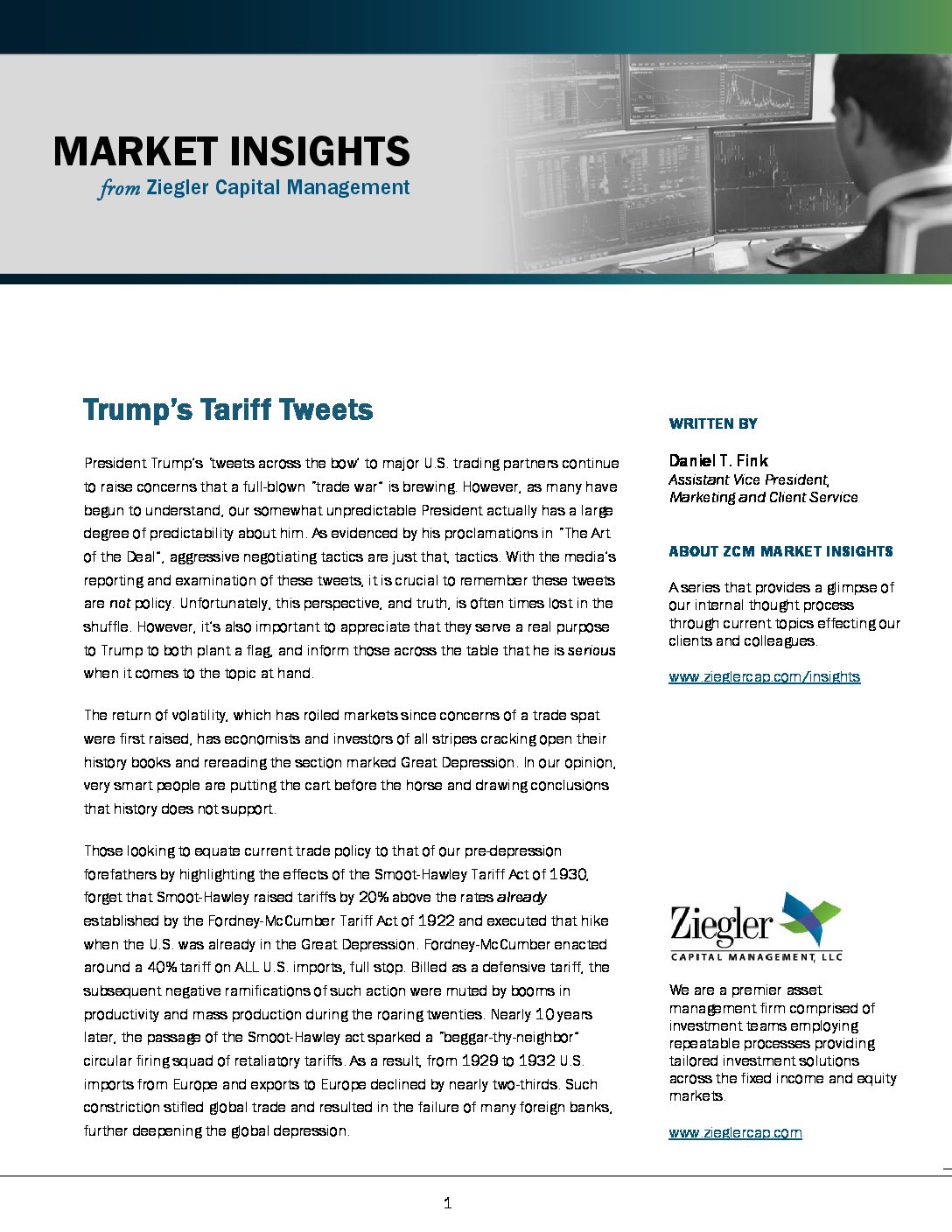Daniel T. Fink
Assistant Vice President,
Marketing and Client Service

President Trump’s ‘tweets across the bow’ to major U.S. trading partners continue to raise concerns that a full blown “trade war” is brewing. However, as many have begun to understand, our somewhat unpredictable President actually has a large degree of predictability about him. As evidenced by his proclamations in “The Art of the Deal”, aggressive negotiating tactics are just that, tactics. With the media’s sensationalist reporting and over examination of these tweets, it is crucial to remember these tweets are not policy. Unfortunately, this perspective, and truth, is often times lost in the shuffle. However, it’s also important to appreciate that they serve a real purpose to Trump to both plant a flag, and inform those across the table that he is serious when it comes to the topic at hand.
The return of volatility, which has roiled markets since concerns of a trade spat were first raised, has economists and investors of all stripes cracking open their history books and rereading the section marked Great Depression. In our opinion very smart people are putting the cart before the horse and drawing conclusions that history does not support.
Those looking to equate current trade policy to that of our pre-depression forefathers by highlighting the effects of the Smoot-Hawley Tariff Act of 1930, forget that Smoot-Hawley raised tariffs by 20% above the rates already established by the Fordney-McCumber Tariff Act of 1922 and executed that hike when the U.S. was already in the Great Depression. Fordney-McCumber enacted around a 40% tariff on ALL U.S. imports, full stop. Billed as a defensive tariff, the subsequent negative ramifications of such action were muted by booms in productivity and mass production during the roaring twenties. Nearly 10 years later, the passage of the Smoot-Hawley act sparked a “beggar-thy-neighbor” circular firing squad of retaliatory tariffs. As a result, from 1929 to 1932 U.S. imports from Europe and exports to Europe declined by nearly two-thirds. Such constriction stifled global trade and resulted in the failure of many foreign banks, further deepening the global depression.
As of right now, the Trump administration has not levied broad tariffs that globally impact U.S. imports. The announcements of these selective tariffs were designed to grab attention, and they certainly succeeded. For the first time in a very long time, people are beginning to consider the intricacies of global trade and wrap their arms around the equality, or lack thereof, of our current trade situation. President Trump is leveraging the consternation caused by these announcements to position future policy announcements as a win. By overreaching, as he has, any moderating position in the future could be seen as a victory for both sides. Moderation allows those targeted countries to proclaim that they have bucked U.S. demands. Likewise, it also allows President Trump to get almost all of what he demanded from the beginning. If such a détente were to take place, the volatility that has been roiling markets since talk of a trade war became serious would most likely begin to dissipate.
Ziegler Capital Management, LLC is a wholly owned subsidiary and affiliated SEC Registered Investment Adviser of Stifel Financial Corp. This material is based upon information that we consider reliable, but we do not represent that it is accurate or complete and it should not be relied upon as such. pinions expressed are our current opinions as of the date appearing on this material only. No part of this material may be duplicated or redistributed without Ziegler Capital Management’s prior written consent. All investments involve risk, including the possible loss of principal, and there is no guarantee that investment objectives will be met. Equity securities are subject generally to market, market sector, market liquidity, issuer, and investment style risks, among other factors to varying degrees. Equity securities may rise and decline in value due to both real and perceived market and economic factors as well as general industry conditions. Indices are unmanaged, do not reflect fees and expenses, and are not available as direct investments.